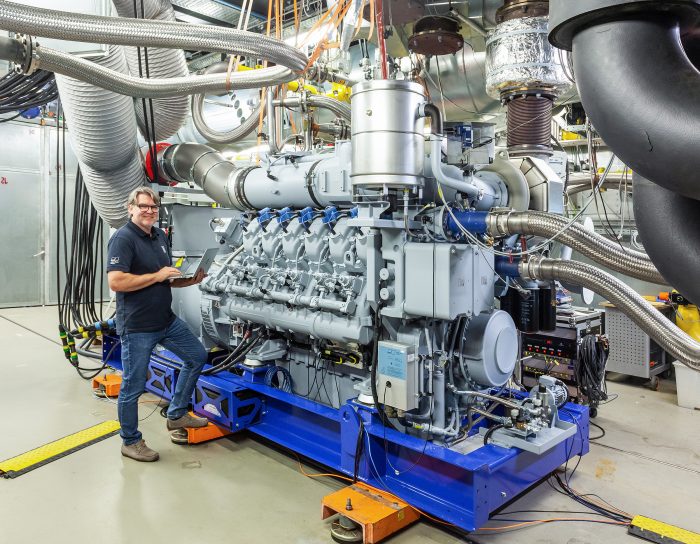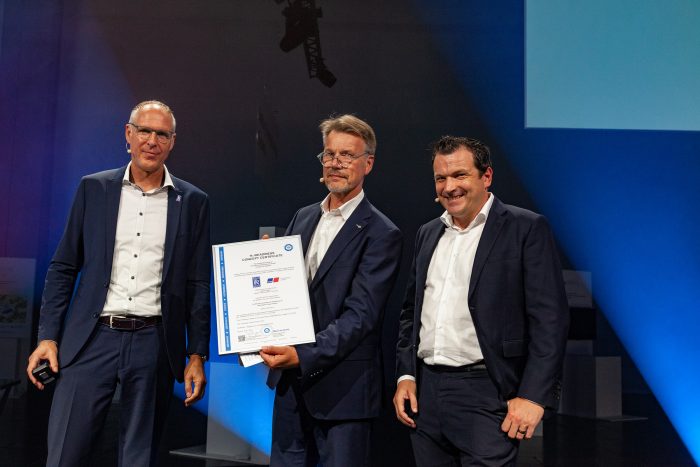Rolls-Royce reaches H2-ready certificate for mtu engines
Rolls-Royce has received H2 readiness certification from TÜV Süd for its current mtu Series 4000 FNER/FV gas engines. H2-ready means that the components and systems are prepared for future use with hydrogen and can be converted accordingly. The certificate is an independent confirmation by one of the leading international testing and certification service providers of the concept with which Rolls-Royce will provide newly built and retrofitted power plants with the aforementioned engines for operation with a hydrogen admixture of up to 25 per cent by volume and for operation with 100 per cent by volume.

When using green hydrogen, the operation of the engines is CO2-free. Another advantage: the strict EU emission limits (e.g. nitrogen oxide) can also be complied with without exhaust gas aftertreatment.This achievement in in line with one of Rolls-Royce’s four strategic pillars – lower carbon and digitally enabled.
“We see hydrogen as one of the key elements of the energy transition. With our strategy of making our engines fit for the use of sustainable fuels, we will make a decisive contribution to its success,” explained Dr Jörg Stratmann, CEO of Rolls-Royce Power Systems.
“The certificate increases investment security for our customers. They can be sure that they will be able to use hydrogen as a fuel with our engines in the future. With this step, we have reached another milestone on our hydrogen roadmap,” said Tobias Ostermaier, President der business unit Stationary Power Solutions at Rolls-Royce Power Systems.
Rolls-Royce to deliver first 100% hydrogen CHP in the next few months
The first installation of mtu engines running on 100% hydrogen is planned for early 2025 for the Enerport II lighthouse project in the German inland port of Duisburg. The two combined heat and power plants will contribute to the CO2-neutral energy supply in the new container terminal. Rolls-Royce engineers are currently testing the engines at the gas engine plant in Augsburg before they are delivered. Tests of the 12-cylinder mtu Series 4000 L64 gas engine have shown very good performance, efficiency and emissions characteristics. The engine has already achieved the project’s desired total output of one megawatt. In the course of further development, 1.2 megawatts are expected.
In the meantime, Rolls-Royce has set up the necessary infrastructure for the test bench runs of the hydrogen engines in the Augsburg and Friedrichshafen plants.
Hydrogen engines of the next generation
In 2024, Rolls-Royce began working in a consortium with five companies and research centres to develop the necessary technologies for highly efficient hydrogen combustion engines to power combined heat and power (CHP) plants. As part of the publicly funded Phoenix (Performance Hydrogen Engine for Industrial and X) project, the next-generation hydrogen engine is set to generate the same electrical and thermal energy (power density and efficiency) as currently available natural gas CHP units in the larger output range (up to 2.5 MW) for the first time.
CO2-free H2 engine power plants follow natural gas and biogas plants as the backbone of the energy transition

As part of the expansion of renewable energies, the German government has decided in favour of building more gas-fired power plants with its power plant strategy and wants to promote them. Smaller, decentralised gas engine plants in particular can flexibly balance out the fluctuating feed-in of wind and solar power into the grid, depending on the weather conditions. Biogas generators are currently being used to reduce CO2 emissions. “We can hardly wait to see our first CO2-free hydrogen CHP in operation in the container port of Duisburg soon. As soon as the availability of green hydrogen is ensured, the technology for highly efficient next-generation hydrogen engines promoted in the Phoenix project will also be ready,” explained Tobias Ostermaier, President of the Stationary Power Solutions business unit at Rolls-Royce Power Systems.
News Categories
- » NEWS HOME
- » Automation & Robotics
- » Industry 4.0
- » Material Handling
- » Sensors
- » Quality & Testing
- » Machine Vision
- » Laser & Optics
- » Metalworking
- » Motion Control & Drives
- » Hydraulics & Pneumatics
- » Process Industry
- » Renewable Energy
- » Agriculture
- » Home & Office Furniture
- » Additive Manufacturing
- » Environmental Tech



